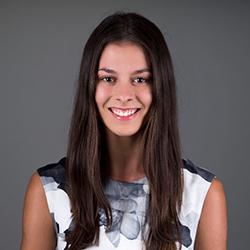
Bachelor of Commerce and Bachelor of Asia-Pacific Studies (Year in Asia) 2015
Anna is an engagement manager at Oliver Wyman, a leading international management-consulting firm, where she leads teams in solving complex strategic problems for businesses. She joined the firm straight from university and has been there for over five years, working on projects in the financial services, telecommunications and energy sectors across Australia, Indonesia, Thailand, New Zealand and France.
Anna completed a Bachelor of Commerce and Bachelor of Asia-Pacific Studies (Year in Asia) at ANU. She undertook the intensive Chinese language exchange program at Zhejiang University in Hangzhou China as part of her Year in Asia.
1 SEPTEMBER 2021
Please tell us about your career trajectory at Oliver Wyman?
I joined Oliver Wyman’s graduate program straight out of ANU and spent my first two weeks in the Singapore office with my cohort across our Asia-Pacific offices learning the ropes. Upon my return, I was staffed at my first client, where coincidentally another ANU alumni, Mu Tian, was in my team. Now, five years later, I’m on my 31st project. My first few years at the firm as a consultant and senior consultant were spent working across Australia and Asia. I assisted my teams with various client problems, ranging from a commodities review for an Australian bank, to a digital strategy for an Indonesian telecommunications company, to a due diligence of a household-name Australian company prior to its sale. Prior to my progression to an associate, which involved leading small projects or work streams with teams of my own, I took on the Social Impact Coordinator role for Asia-Pacific. This involved sourcing, staffing, and general coordination of all our pro-bono work in the region. It was a great opportunity to play a role in determining who and how best Oliver Wyman could assist not-for-profits. Today, I work as an engagement manager, which involves leading large projects across a range of topics where I am considered the day-to-day project lead for my clients. I tend to focus on topics that involve governance and culture, and have particularly enjoyed my time working with Boards.
What is your advice to students to best prepare for case interviews?
Case interviews are a unique component of consulting interviews and require preparation to do well. My first suggestion is to source one of a multitude of case preparation guides. Many can be found online as eBooks and often come with a small fee. A well-known one is called Case in Point. These will provide a good overview on how the process works and detail strategies for how to approach the interview.
I would also suggest visiting the websites of the consulting firms you are applying to and read their preparation guides, as many include practice cases or guides on how to prepare for that particular firm’s case interview. Oliver Wyman’s preparation guide is here. Finally, find a friend you can practice with or practice saying your answers out loud. It’s one thing to mentally prepare how you would to respond to a question, and another to vocalise it.
Once you’ve done your reading, here are my key tips as an interviewer for doing well:
- Prepare, but don’t over prepare: It is noticeable to an interviewer when someone has over prepared. They are overly reliant on frameworks, don’t bring in a lot of creativity, and stumble on questions that don’t match with what they prepared for. I have seen many instances of students force-fitting a unique case question into a strategy they’ve seen work well in their preparation. My suggestion is to prepare so that you have a few frameworks and strategies under your belt, but to then “put the book away” before your interviews. Be open to answer questions in different ways.
- Structure, structure and structure: A well-structured average response to a case interview question will do better than a good response that is poorly structured. While it’s important to have raw analytical skills, you need to be able to harness them in a way that’s accessible to the interviewer. A large component of consulting is being able to communicate your analysis or recommendations to your client, and structure is key. Don’t be afraid to ask the interviewer for a few moments to write down your thoughts and structure your response before launching into your answer.
- Be creative: Creativity is not a requisite in interviews, but it goes a long way and will make you memorable to the interviewer. Depending on the question you get, see where you can add something unique to your answer.
How can ANU students make the most of their bilingual or multi-lingual capabilities?
While I wouldn’t quite call myself bilingual, my experience living and studying in China as part of my ANU degree has reaped its rewards in many ways. I made some incredible and lifelong friends, I learned Chinese in the best way possible (immersion), and I spent an inordinate amount of time travelling the broader region; from Kazakhstan to North Korea. Professionally, I have not had cause to use my language skills in my current role, apart from at a conference in Shanghai where I was very helpful when dealing with taxi drivers. However, my commitment to developing my language skills, in particular a language considered strategic for an Australian, was highly regarded in interviews. For students to make the most of their language capabilities in the workplace, and where I fell short, is to develop them to business fluency. I hope at a later stage in my career to spend more time in China with this goal in mind.
